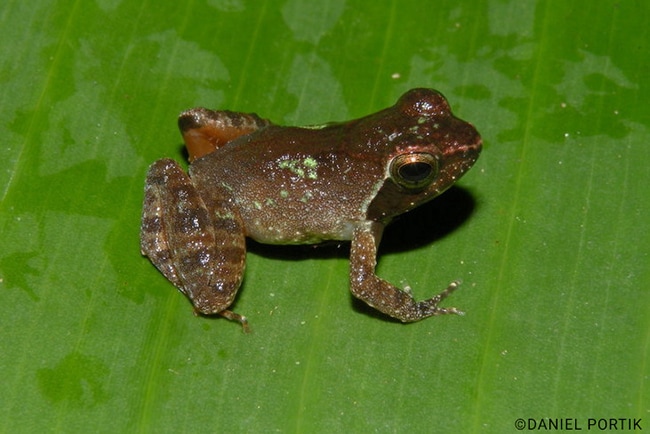SAVE THE FROGS! Ghana (STF! Ghana) is dedicating hundreds of working hours in search of one of West Africa’s rarest frogs, the critically endangered Intermediate Puddle Frog (Phrynobatrachus intermedius) at south-western Ghana’s Ankasa Conservation Area, it’s only known home. Since its discovery of three individuals in 2001, there have not been any further sightings despite several focused surveys in other localities, including Tanoé-Ehy Swamp Forest, Banco National Park, and Taï National Park in neighbouring Cote d’ lvoire. Not surprisingly, nothing is known yet about its population status, distribution, natural history, and tolerance to threats. Scientists from STF! Ghana, therefore, is committing an entire year of continuous searches in an attempt to rediscover and bridge this knowledge gap. Alongside this, the team will train local park rangers to incorporate surveys in their routine wildlife monitoring activities to increase the chances of rediscovery.
The Ankasa Conservation Area is one of Ghana’s best-protected forests. Regardless, there still is heavy dependence on Non-Timber Forest Products, including raffia palm tapped for a local ‘wine.’ This activity within the species’ habitat puts it in imminent danger of disappearing; thus, offering little opportunity to know more about its biology and ecology. STF! Ghana, in collaboration with Ghana’s Forestry Commission, is, therefore, conducting proactive conservation actions alongside the searches by planting 10,000 raffia palm trees to secure the species’ type locality before it is lost. Additionally, we will assist 100 local palm wine tappers in planting 2,000 seedlings of raffia palm trees in suitable areas on their farms to reduce pressures on wild palms within the species’ habitat; and educate an estimated 20,000 local people including school children from surrounding communities on the need to protect P. intermedius.
The project is expected to benefit co-occurring threatened amphibian species such as Ghana River Frog (P. ghanensis) and Yapo River Frog (P. villiersi), as well as non-amphibian species including Forest Elephant (Loxodonta africana cyclotis) and White-breasted Guinea Fowl (Agelastes meleagrides).
This project is sponsored by Mohammed bin Zayed Species Conservation Fund and Prince Bernhard Nature Fund.

